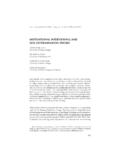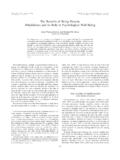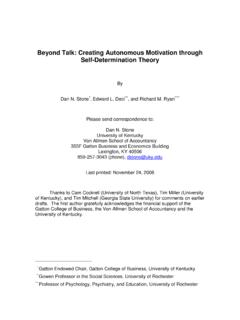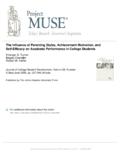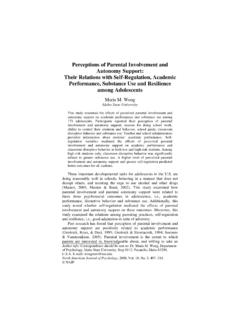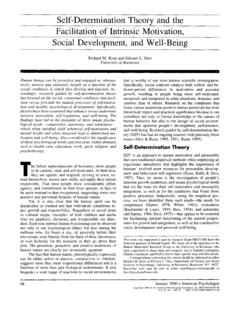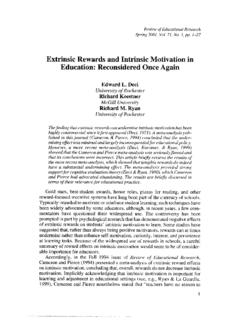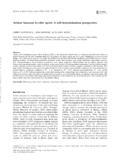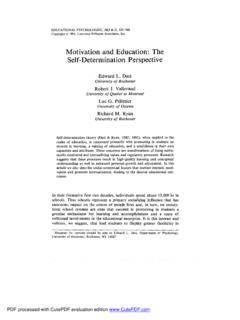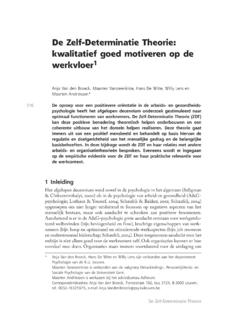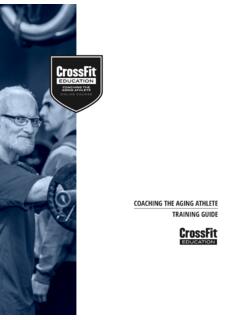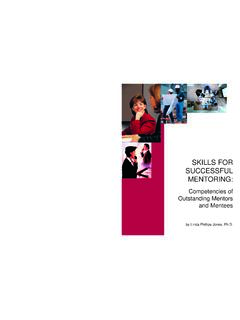Transcription of Psychology of Sport and Exercise - Self-Determination Theory
1 Psychology of Sport and Exercise 14 (2013) 852e859. Contents lists available at ScienceDirect Psychology of Sport and Exercise journal homepage: Determinants of coach motivation and autonomy supportive coaching behaviours Meredith A. Rocchi a, *, Luc G. Pelletier a, A. Lauren Couture b a University of Ottawa, 136 Jean Jacques Lussier, Ottawa, ON, Canada K1N 6N5. b University of the Fraser Valley, 45190 Caen Ave, Chilliwack, BC, Canada V2R 0N3. a r t i c l e i n f o a b s t r a c t Article history: Objective: The objective of the present study is to build upon the existing literature examining the Received 16 February 2013 coaching context and how it relates to coaches' use of autonomy-supportive interpersonal behaviours Received in revised form ( Stebbings, Taylor, Spray, & Ntoumanis, 2012) by identifying additional environmental factors and 12 July 2013. exploring the role of coach motivation. Accepted 21 July 2013. Available online 20 August 2013.
2 Design: An academic model designed by Pelletier, Seguin-Levesque, and Legault (2002) to predict teacher motivation and autonomy-supportive styles in academic settings, was adapted to the coaching context. Keywords: Autonomy supportive behaviour Methods: The in uence of pressure from above ( Sport administrations) and pressure from below (athlete Model validation motivation) on coach motivation and autonomy-supportive coaching behaviours was tested using Self-Determination Theory structural equation modeling. coaching Results: Results support the t of the model in a Sport context. Sport Conclusions: Pressure from above, pressure from below, and coach motivation predict coaches' reported use of autonomy-supportive behaviours. 2013 Elsevier Ltd. All rights reserved. Introduction More speci cally, when individuals engage in activities, the un- derlying reasons for participating vary from being related to Sport participation is associated with increased health and external outcomes, to being integrated with the self.
3 As the external positive outcomes like well-being, vitality, and increased self- reasons for participating become internalized, they become esteem (Bouchard, Blair, & Haskell, 2007). Motivational psychol- coherent with the individual's values or objectives and the indi- ogy has extensively examined Sport participation and has provided vidual experiences higher quality motivation and increased posi- important insight into the reasons why some athletes demonstrate tive outcomes (Deci & Ryan, 2000). an enduring desire to improve or master their Sport . Research has According to SDT, the three basic psychological needs, which are shown that although some athletes are moved by external factors said to be innate, universal across cultures, and evident in all like pressure from their coach, reward systems, evaluations, and developmental periods, can aid in this internalization process. The recognition, others are moved by curiosity and interest, a desire for three needs are competence (when an individual has the oppor- growth and improvement, and a desire to master new skills tunity to seek challenges and demonstrate their capacities), relat- (Vallerand, 2007).
4 Motivational theories help explain the condi- edness (when an individual experiences a sense of belonging with tions that lead to a successful or unsuccessful Sport experience by others), and autonomy (when an individual acts in line with his or providing a framework for understanding the interactions between her own interests and values) (Ryan, 1995). When considering the the forces acting on individuals (Hagger & Chatzisarantis, 2007). ful lment of the psychological needs, environmental factors, including the individuals within a given environment, can promote Self determination Theory or thwart the ful lment of the basic needs (Deci, Shwartz, Sheinman, & Ryan, 1981). Deci and Ryan (1985) explain that in- Self-Determination Theory (SDT; Deci & Ryan, 1985) is a Theory dividuals can engage in need-supportive interpersonal behaviours of human motivation that has helped explain Sport participation. which support others' needs and subsequently enhance self- determined motivation.
5 Although need-supportive behaviours * Corresponding author. Tel.: 1 613 562 5800x4179; fax: 1 613 562 5147. can be described in terms of each of the three basic psychological E-mail addresses: ( Rocchi), ( Pelletier), needs, the majority of current research has focused on autonomy- (A. Lauren Couture). supportive behaviours. Extensive research has demonstrated that 1469-0292/$ e see front matter 2013 Elsevier Ltd. All rights reserved. Rocchi et al. / Psychology of Sport and Exercise 14 (2013) 852e859 853. autonomy-supportive environments are related to an increase in exhaustion and depersonalization as predictors of controlling the quality of motivation and positive outcomes experienced by teaching styles. individuals within that environment ( Deci & Ryan, 2002; Gillet, While researchers have examined the predictors of autonomy- Vallerand, Amoura, & Baldes, 2010; Mageau & Vallerand, 2003). supportive behaviours in school physical education settings ( Hagger, Chatzisarantis, Culverhouse, & Biddle, 2003; Pihu, Hein, Koka, & Haggar, 2008), to date, only a couple of studies Autonomy support have examined such predictors in Sport contexts.
6 Stebbings, Taylor, and Spray (2011) focused on psychological factors and autonomy- An individual engages in autonomy-supportive behaviours supportive coaching behaviours. They found that the coaches'. when they offer meaningful choice (Katz & Assor, 2007), minimize perception of the satisfaction of three basic needs predicted an pressure and avoid controlling behaviour (Black & Deci, 2000), increase in well-being, which subsequently predicted autonomy- acknowledge others' feelings (Deci, Egharari, Patrick, & Leone, supportive coaching behaviours. In a separate study, Stebbings et 1994), and allow the others to participate in the decision-making al. (2012) examined how environmental factors, like job security, process (Deci, Koestner, & Ryan, 1999). work-life con ict, and professional development opportunities, Autonomy-supportive interpersonal behaviours play an impor- were related to coaches' need-support, well-being, and subsequent tant role in dyadic interactions between supervisors and sub- use of autonomy-supportive behaviours.
7 Ordinates (Mageau & Vallerand, 2003). Speci cally, when In Sport , coaches play an important role in creating the athletes'. supervisors support their subordinates' need for autonomy, they Sport experience and their interpersonal styles can impact athletes'. ultimately help their subordinates meet their needs, and therefore overall motivation for their Sport (Vallerand & Losier, 1999). Despite increase self-determined motivation (Pelletier et al., 2002). These having empirical support for the use of autonomy-supportive ndings have implications for Sport , as the coacheathlete rela- coaching styles, and some evidence supporting the factors that pre- tionship has a similar structure, which suggests that the coaches'. dict these styles, many coaches still use strategies and techniques that interpersonal behaviours can have important implications on do not support their athletes' needs ( Fraser-Thomas & C t , 2009). athlete motivation (Bartholomew, Ntoumanis, Ryan, Bosch, &.)
8 Th gersen-Ntoumani, 2011). Limitations of current research Previous research in Sport has found that when coaches support their athletes' autonomy, the athletes subsequently experience Despite important advances, there are some limitations to the better performance, increased persistence, an increase in self- current research in understanding autonomy-supportive coaching determined motivation, and enhanced psychological well-being behaviours. Although Stebbings et al. (2011, 2012) begun to (for a review: Mageau & Vallerand, 2003). examine the psychological and environmental factors that impact these behaviours, they have focused exclusively on how these Predictors of autonomy support factors impact autonomy-supportive coaching behaviour through psychological well- and ill-being. Self-Determination Theory Research has supported the link between autonomy-supportive research suggests that motivation should play an important role in interpersonal behaviours and positive outcomes, although, the predicting the use of autonomy-supportive coaching behaviours predictors of autonomy-supportive behaviour have received much (Deci & Ryan, 1985; Roth, Assor, Kanat-Maymon, & Kaplan, 2007).
9 Less empirical attention. Recently, researchers in academic, physical As such, autonomy-supportive coaching behaviours should also be education, and Sport settings have begun to examine the environ- examined form a motivational perspective, in addition to a well- mental and psychological factors that determine these interper- being perspective. sonal behaviours. Furthermore, previous research examining the coaching context In one of the rst studies to examine these constructs, Pelletier has shown that club administrations and the club culture can have et al. (2002) examined the impact of perceived administrative a signi cant impact on coaches (Cushion & Jones, 2006), while pressure, perceived student motivation, and teachers' self-reported motivation research also suggests that athletes can have an impact motivation and their relationship with autonomy-supportive be- on coaches' motivation through behavioural con rmation (Pelletier haviours.)
10 These environmental factors were selected as they had & Vallerand, 1996). As such, coaching research should aim to sys- previously been tested in laboratory settings and were related to tematically examine how Sport administrations and athletes can self-determined motivation (Deci, Spiegal, Ryan, Koestner, & exert pressure on coaches. Kauffman, 1982; Pelletier & Vallerand, 1996). They tested a num- Finally, Trudel and Gilbert (2006) identify three types of coaches ber of models using these factors and their nal model suggested (recreational, developmental, and elite) that vary based on their that teachers' self-determined motivation positively predicted experience and level of commitment to coaching . Traditionally, autonomy-supportive teaching behaviours. Furthermore, they most studies examining coaching contexts have focused exclusively found teachers' self-determined motivation was negatively on elite coaches ( Cushion & Jones, 2006) and it was not until impacted by their impressions of administrative burdens (Pressure recent years that researchers began to examine coaches of various from Above) and positively impacted by their perceptions of their levels ( Lemyre, Trudel, & Durand-Bush, 2007) and, when students' motivation for learning (Pressure from Below).
